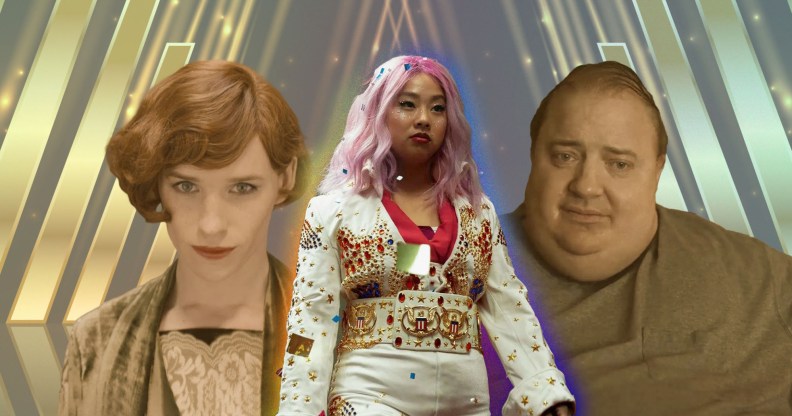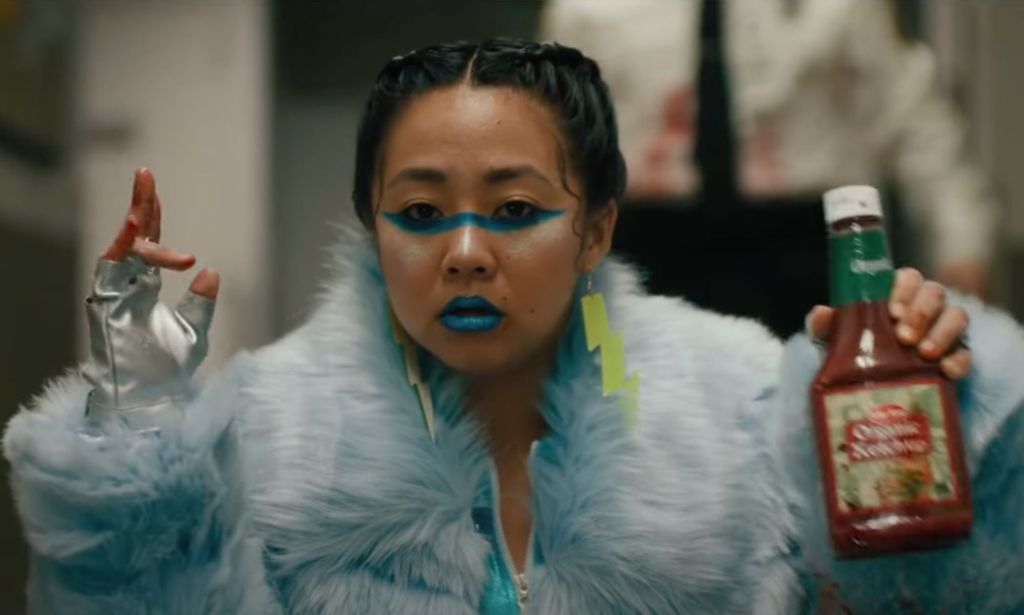Oscars 2023: Stephanie Hsu losing and Brendan Fraser winning is a punch to the gut for LGBTQ+ people

Eddie Redmayne and Brendan Fraser have both won Oscars for playing LGBTQ+ people. Queer actor Stephanie Hsu has not. (A24/Universal)
Eddie Redmayne and Brendan Fraser have both won Oscars for playing LGBTQ+ people. Queer actor Stephanie Hsu has not. (A24/Universal)
The Oscars overlooking Everything Everywhere All At Once star Stephanie Hsu proves that when it comes to LGBTQ+ representation in Hollywood, it is often one step forward and two steps back.
This awards season has seen major ups and downs when it comes to representation. While Michelle Yeoh made history as the first Asian woman and second woman of colour to win Best Actress in the Oscars’ 95-year history, there were a number of high-profile snubs: from the omission of acclaimed Black-led films Till and Viola Davis’ The Woman King to the complete lack of women in the Best Director category.
LGBTQ+ storytelling was rewarded, but queer actors were entirely overlooked – a situation best summed up by Everything Everywhere All At Once winning Best Picture, but Stephanie Hsu losing Best Supporting Actress to co-star Jamie Lee Curtis.
Although both gave stellar performances, it is clear that Hsu was the standout of the film.
The entire plot of Everything Everywhere All At Once hinges on the relationship between Evelyn (Yeoh) and her daughter Joy (Hsu), specifically Evelyn’s refusal to embrace Joy’s queerness.
The pair’s chemistry, raw honesty and their final scene where both bare their souls in an attempt to salvage the love they have for one another makes the film what it is. Oh, and Hsu just casually slays in a second role as the multi-dimensional supervillain, Jobu Topaki.
It follows a frustrating trend of LGBTQ+ actors losing out at the Oscars, while straight actors are celebrated for playing LGBTQ+ roles.
Straight actors keep winning Oscars for LGBTQ+ roles
Aside from Everything Everywhere’s haul one of the biggest winners of this year’s Oscars was straight actor Brendan Fraser, who took home Best Actor for playing a 600-pound gay man in The Whale.
He follows in the footsteps of Eddie Redmayne, who won for playing a trans woman in The Danish Girl; Sean Penn, for playing seminal LGBTQ+ rights activist Harvey Milk in Milk; and Rami Malek, who won for Bohemian Rhapsody in 2018.
William Hurt, Tom Hanks and Philip Seymour Hofman have also won Oscars for playing gay men, while Olivia Colman won for playing queer monarch, Queen Anne in The Favourite
Meanwhile, very few openly queer actors have won or even been nominated: before Hsu, just Ian McKellen, Angelina Jolie, Lady Gaga, Kristen Stewart and Ariana DeBose (who won in 2022). Many others have been nominated or won before coming out, including Jodie Foster and Elliot Page, and there have been LGBTQ+ winners in non-acting categories.
But progress feels slow, and given the number of overlooked, elsewhere acclaimed performances by queer actors, there seems to be an issue.

It begs the question as to why Keke Palmer in Nope, Jeremy Pope in The Inspection, Pakistan’s Joyland and Morocco’s The Blue Caftan were all snubbed. To me, the answer is the consistent pushing out of LGBTQ+ people of colour from the industry, even when they are making groundbreaking cinema.
All this is not to say that actors must exclusively align with the sexuality they are playing. As we have learnt from Kit Connor and the ongoing debate on whether celebrities can queerbait (they can’t), there will always be cases where the situation is not clear cut.
After Hsu was nomniated, she told EW her character “represents the younger generation, the people who are waiting in the wings, the people who see themselves in Joy or Jobu or both, the queer community”.
“I feel really grateful to be able to be the person who’s ushering in that wave of people alongside me,” she said.
It felt eerily similar to Halle Berry’s 2022 acceptance speech, given when she became the first woman of colour to win Best Actress (Berry returned this year to present the same award to Yeoh)
“This moment is so much bigger than me. It’s for every nameless, faceless woman of colour that now has a chance because this door tonight has been opened,” she said at the time.
The similarities in their words underline the fact that these fights for representation are all interlinked.
We can’t allow another two decades to go by before we see the hard-earned progress of marginalised actors coming to fruition. The time is now for the industry to reflect on who is telling our stories and how the most valuable art is the one that is brave enough to champion something new.

